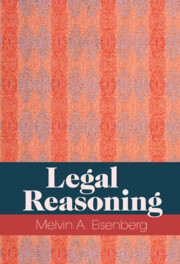Book contents
- Legal Reasoning
- Legal Reasoning
- Copyright page
- Dedication
- Contents
- Preface
- 1 A Brief Introduction to the Common Law
- 2 Rule-Based Legal Reasoning
- 3 Reasoning from Precedent and the Principle of Stare Decisis
- 4 How It Is Determined What Rule a Precedent Establishes
- 5 Reasoning from Authoritative Although Not Legally Binding Rules
- 6 The Role of Moral, Policy, and Empirical Propositions in Legal Reasoning, and the Judicial Adoption of New Legal Rules Based on Social Propositions
- 7 Legal Rules, Principles, and Standards
- 8 The Malleability of Common Law Rules
- 9 Hiving Off New Legal Rules from Established Legal Rules, Creating Exceptions to Established Rules, and Distinguishing
- 10 Analogy-Based Legal Reasoning
- 11 The Roles of Logic, Deduction, and Good Judgment in Legal Reasoning
- 12 Reasoning from Hypotheticals
- 13 Overruling
- Acknowledgments
- Index
1 - A Brief Introduction to the Common Law
Published online by Cambridge University Press: 22 September 2022
- Legal Reasoning
- Legal Reasoning
- Copyright page
- Dedication
- Contents
- Preface
- 1 A Brief Introduction to the Common Law
- 2 Rule-Based Legal Reasoning
- 3 Reasoning from Precedent and the Principle of Stare Decisis
- 4 How It Is Determined What Rule a Precedent Establishes
- 5 Reasoning from Authoritative Although Not Legally Binding Rules
- 6 The Role of Moral, Policy, and Empirical Propositions in Legal Reasoning, and the Judicial Adoption of New Legal Rules Based on Social Propositions
- 7 Legal Rules, Principles, and Standards
- 8 The Malleability of Common Law Rules
- 9 Hiving Off New Legal Rules from Established Legal Rules, Creating Exceptions to Established Rules, and Distinguishing
- 10 Analogy-Based Legal Reasoning
- 11 The Roles of Logic, Deduction, and Good Judgment in Legal Reasoning
- 12 Reasoning from Hypotheticals
- 13 Overruling
- Acknowledgments
- Index
Summary
Law can be divided into sets of binary categories. One such set consists of public law, which concerns such matters as the powers of governmental institutions, on the one hand, and private law, which concerns such matters as the relationships between private persons, on the other. Another set consists of civil law and common law. In civil law systems, which prevail in Europe, Latin America, and most of Asia, public law is largely found in statutes, while private law is largely found in civil codes. In common law systems, which prevail in England and former English colonies, in particular the United States, private law is largely made by courts, in the form of rules adopted in judicial decisions. American private law is largely made by courts because complex societies need a great deal of private law to facilitate private planning, shape private conduct, and facilitate the settlement of private disputes, and the capacity and ability of American legislatures to make private law is limited. As a result, American courts have two functions: resolving disputes and making law.
- Type
- Chapter
- Information
- Legal Reasoning , pp. 1 - 4Publisher: Cambridge University PressPrint publication year: 2022

